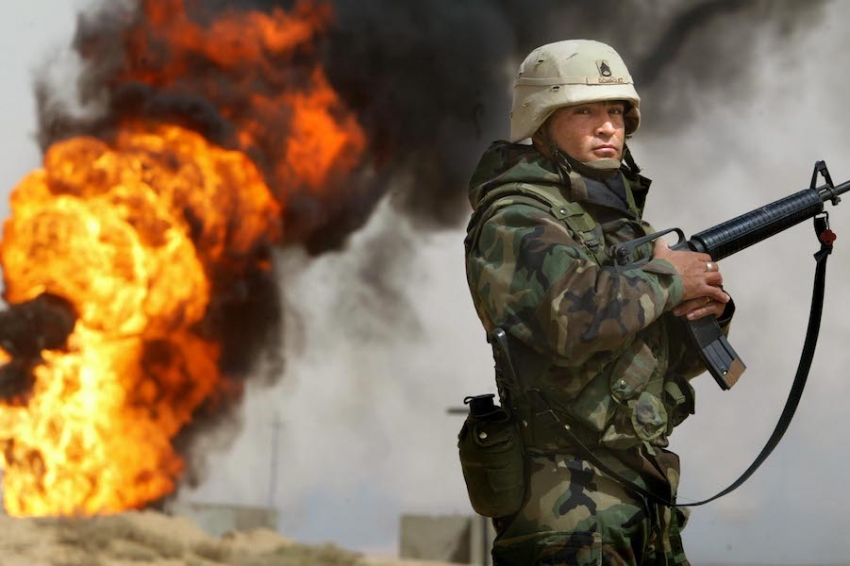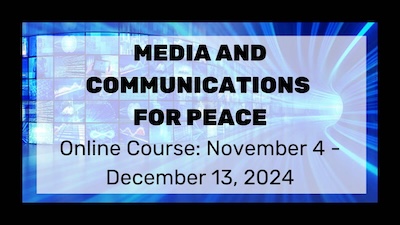
By Solange Lyhuitekong, Executive Secretary at Cameroon for a World BEYOND War, November 16, 2022
States, political, community or regional groups are constantly engaged in conflict that easily becomes armed, aided by the expanding arms industry. When we talk about victims of war, we usually instinctively refer to dead, raped or displaced human beings, as well as livestock. Yet the climate is a silent and neglected victim of armed conflict. This makes the “International Day for Preventing the Exploitation of the Environment in War and Conflict” meaningful. The changing climate is a victim of war. This is a diagnosis that must help in the action during the 27th UN Climate Change Conference of the Parties (COP27) happening in Sharm El-Sheikh, Egypt, to tackle the root cause that is war.
Cameroon has been facing wars for a decade now, following the terrorism of Boko Haram in the Far North and then the demands of separatists in the North West and South West regions. Since the beginning, it is easy to count the number of people killed, villages burnt, livestock destroyed, human activity slowed down, etc. We did not notice that the environment suffers silently, under the weight of the war that overwhelms it. Forest, soil, air, water and sanitation have been destroyed. In ten years of armed conflict, the climatic balance sheet is catastrophic with impact on people’s mental health, who no longer have any real control over the climate of their region. The overcrowding of cities neighbouring conflict areas due to the massive displacement of people fleeing the war contributes to climate changes. The rapid degradation and impoverishment of the soil caused by military equipment and remains has caused the scarcity of foodstuffs on the markets.
In ten years of war, Cameroonians are witnessing how wars have been destroying the planet for centuries, as the climate changes observed are the result of a totally dysfunctional global system. War is not the only cause, but it appears to be the most shameful human cause, because war is neither inevitable, necessary, beneficial nor justified. These are the myths that our organization Word Beyond War, a global movement to abolish the institution of war, is acting to debunk.
The 27th World Climate Change Conference brings the hope to believe that the United Nations and all the voices gathered in Sharm El-Sheikh from 6-18 November will not remain unresponsive to the destruction of our ecosystem. We look forward to collective action to tackle causes of war and ensure that humanity speaks only the language of peace.
Le climat : une victime de guerre à soigner par la COP27
Les Etats, groupes politiques, communautaires ou régionaux se livrent sans cesse à des affrontements qui deviennent facilement armés, aidés par l’industrie florissante de l’armement. Parler de victimes de guerre renvoie généralement par instinct aux êtres humains décédés, violés ou déplacés, ainsi qu’aux animaux. Pourtant, le climat est une victime silencieuse et négligée des conflits armés. Ceci donne son sens à la « journée internationale pour la prévention de l’exploitation de l’environnement en temps de guerre et de conflit ». Le climat qui change est une victime de la guerre. Voici un diagnostic qui doit aider à l’action pendant la 27e conférence des parties au changement climatique des Nations unies (COP27) à Sharm El-Sheikh en Egypte, à savoir attaquer cette cause profonde qui est la guerre.
Il y a une décennie déjà que le Cameroun fait face aux guerres, suite au terrorisme de Boko Haram à l’Extrême-Nord et ensuite aux demandes des séparatistes dans les régions du Nord-Ouest et du Sud-Ouest. Depuis le début, on dénombre facilement le nombre de personnes tuées, les villages brulés, le bétail détruit, on constate le ralentissement de l’activité humaine, etc. Les forêts sont détruites, l’oxygène est réduit, la faune et la flore périssent. Mais on ne constate pas que les plantes meurent sans pousser un cri, l’environnement souffre en silence, sous le poids de la guerre qui l’accable. En dix ans de conflits armés, le bilan climatique est catastrophique : l’écosystème subit une destruction qui provoque la stérilité des sols, la pollution de l’environnement, avec des conséquences sur la santé mentale des populations, qui n’ont plus une maitrise réelle sur le climat de leur région et même du pays. La destruction des forets par les feux pendant les combats provoque la pollution, la température des sols, de l’air et de l’eau change continuellement. Le surpeuplement des grandes agglomérations voisines des régions en conflit du fait des déplacements massifs des personnes fuyant la guerre contribue à ces changements climatiques. La rareté des produits vivriers sur les marchés serait due à la dégradation rapide et l’appauvrissement des sols provoqués par les équipements et restes militaires.
En dix ans de guerre, les camerounais ont pu voir comment les guerres détruisent le monde depuis des siècles, car les changements climatiques observés sont l’apanage d’un système mondial totalement déréglé. La guerre n’est pas l’unique cause, mais apparaît comme la cause humaine la plus honteuse, parce que la guerre n’est pas inévitable, elle n’est pas nécessaire, elle n’est pas bénéfique, elle n’est pas justifiée. Il s’agit là des mythes que Word Beyond War, un mouvement mondial visant à abolir l'institution de la guerre, travaille à déconstruire. La 27e conférence mondiale sur les changements climatiques donne à notre organisation l’opportunité de croire que les Nations unies et toutes les voix qui y sont réunies ne resteront pas indifférents face à la destruction de notre écosystème, mais agiront ensemble pour mettre fin aux guerres et faire en sorte que l’humanité ne parle que le langage de la paix.








